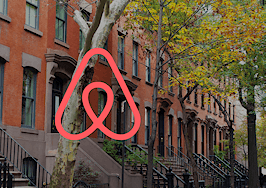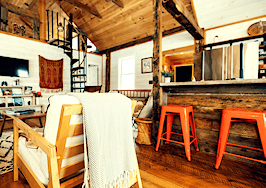No one can predict the future of real estate, but you can prepare. Find out what to prepare for and pick up the tools you’ll need at Virtual Inman Connect online Nov. 1-2, 2023. And don’t miss Inman Connect New York on Jan. 23-25, 2024, where AI, capital and more will be center stage. Bet big on the future and join us at Connect.
October brought the “Airbnbust.” In June, it was the “Airbnb Crash.” Now some world-renowned real estate investors are predicting that the short-term rental platform will face tough times.
This time it was Robert Kiyosaki, an investor who is famous for writing the book Rich Dad, Poor Dad, who took to X, the social media platform formerly known as Twitter, and predicted that the short-term rental king would actually bring the whole market down.
“AIR B&B to lead real estate market crash,” Kiyosaki told his 2.4 million followers this month.
AIR B&B to lead real estate market crash. If you want a new home your happy days are around the corner. Same for rental property. The best time to get rich is in a crash. Good luck.
— Robert Kiyosaki (@theRealKiyosaki) September 6, 2023
Several other investors chimed in, saying that homes were being bought at high prices under the speculation that prices and demand would stay high enough to pay off any loans used for the purchase.
“There were [too] many speculators when they should have been investors,” real estate investor Joe Killinger wrote.
It seems that every few months, the king of short-term rentals faces a viral storm that starts online, burns hot and then, ultimately, fizzles out without coming to fruition. Month after month, despite predictions of an impending collapse, Airbnb keeps attracting more hosts and travelers to the platform.
Airbnb has grown to become a $93 billion company. The public company reported record supply added in the second quarter of the year, which was met by strong demand and the company’s most profitable quarter ever.
The company routinely draws the ire of housing advocates who view short-term rentals as a siphon of housing that could otherwise be used as long-term rentals, or sold to homebuyers.
That has led to policy changes in some cities and, every quarter or so, predictions like Kiyosaki’s that catch fire and spread online, whether they’re based in reality or not.
With a growing housing affordability crisis, advocates view the growing company as a tangible way they can influence the problem, said Bram Gallagher, an economist with AirDNA, which tracks the short-term rental industry.
“There’s just enormous frustration and anger about the housing situation in the U.S.,” Gallagher said. “And maybe rightfully so.”
“That’s why it goes viral,” he added. “They’re saying, ‘Maybe this could be a solution to our terrible problem.’ Unfortunately it’s not going to be a great aid in housing affordability.”
No crash, no bust
A series of posts on Twitter suggested Airbnb bookings and prices cratered in May, a purported drop that one user said had huge implications for both the short-term rental and broader real estate markets.
The writer purported to have data that showed Airbnb revenue per listing had dropped 50 percent, and wrote an extensive thread about how the platform was crashing.
The tweet generated countless headlines and was viewed over 35 million times.
The Airbnb collapse is real.
Revenues are down nearly 50% in cities like Phoenix and Austin.
Watch out for a wave of forced selling from Airbnb owners later this year in the areas hit hardest by the revenue collapse. pic.twitter.com/xjGkj7bFC5
— Nick Gerli (@nickgerli1) June 27, 2023
But there was a problem: Airbnb and other economists told Inman the data shared in the viral Tweets wasn’t accurate.
“The data is not consistent with our own data,” an Airbnb spokesman said in a statement at the time. “As we said during our Q1 earnings, more guests are traveling on Airbnb than ever before, with Nights and Experiences Booked growing 19 percent in Q1 2023 compared to a year ago.”
Indeed, Airbnb has seen average daily rates — the metric it uses to measure the price of a night in an Airbnb — remain stubbornly high. That’s been a boon for the company’s bottom line, but also a possible threat as the price of staying in an Airbnb comes closer to the cost of staying in a hotel.
The company said during its first-quarter earnings call that it expected average daily rates to slow down, but continue growing.
“We think the ADRs as we continue to see growth in Europe, Latin America and Asia, should continue to moderate here in the second quarter,” Airbnb Chief Financial Officer Dave Stephenson said. “Year-over-year growth in ADR should still be down in that mid-single digit range.”
While the viral Tweet looked at only a handful of markets, rather than the average across the U.S., it seems unlikely that the data is accurate.
AirDNA, another company that tracks short-term rental data and sells insights to investors, disputed the figures from the social media posts.
“Is it down in 2023? YES. Is it down 40 percent? NO,” wrote Jamie Lane, chief economist at AirDNA. “The average market listed is seeing RevPAL decrease of -3.6 percent, not -40.3 percent.”
The “Airbnb Crash” came just a few months after a five-word post on social media by a Texas economist:
“The Airbnbust is upon us,” Amy Dixon wrote in October.
That post, too, caught fire, was shared thousands of times and seen by millions of people.
The Airbnbust is upon us#Airbnb pic.twitter.com/2BMTjGhiox
— Amy Nixon (@texasrunnerDFW) October 16, 2022
Analysts at the time also called the prediction a hoax. Nine months later, Airbnb reported its profits had grown 72 percent year-over-year.
What investors are watching
Morningstar senior equity analyst Dan Wasiolek closely monitors companies like Airbnb, helping to advise on the company’s current and future performance.
If there’s an impending crash led by Airbnb, Wasiolek isn’t aware of it.
The average daily rate is nearly one-and-a-half times higher now than it was in 2019. And while the expectation was that rates would fall slightly, daily rates have actually risen by about 1 percent, Wasiolek said.
“This is despite a mix shift to urban and international from the U.S. and non-urban, which tend to have lower rates,” Wasiolek said. “It indicates that hosts are still able to get good rates.”
“These key metrics through the most recently reported second-quarter earnings indicate both Airbnb and hosts are doing well,” Wasiolek said.
Likewise, multiple major trading firms recommend Airbnb as a good stock to hold onto. Credit Suisse expects the stock to be trading at about 10 percent higher than it is today, indicating a positive outlook.
All of that should bode well for the company itself and, therefore, the hosts and travelers who fuel it.
AirDNA’s Gallagher said the company’s upcoming research shows nightly rates rose again in August. He noted there was an increase in occupancy rates, but also pointed out that markets that are prone to natural disasters have been hit particularly hard.
Possible warning signs?
Despite the recurring online hoaxes, there are a few actual threats that could impact the bottom lines of the company and individual hosts.
Particularly vulnerable are any investors who are overleveraged and reliant on peak performance and high prices to repay any loans used to buy the property.
“Owners overpaid for these properties and likely depend on others to rent the unit to be able to afford the payments,” one investor wrote on X. “Once discretionary spending grinds to a halt, these owners, despite the low rate payment, will be forced to sell.”
Owners refinanced/purchased at those low rates. Owners overpaid for these properties and likely depend on others to rent the unit to be able to afford the payments. Once discretionary spending grinds to a halt, these owners, despite the low rate payment will be forced to sell.
— TheFoodSafetyGuy (@afoodsafetyguy) September 7, 2023
“There won’t be enough rental business for them to continue making the mortgage payments [and] turn a profit, especially if these were on a variable interest rate,” the investor continued.
Still, the company has said that “the vast majority of our hosts share only one listing,” suggesting the platform is primarily run by individual hosts who are renting part or all of their properties, rather than investors who have portfolios of short-term rentals and are therefore more exposed to a market downturn.
The possible warning signs Wasiolek is watching have more to do with strategic initiatives the company is making to keep prices in check than with the possibility of a housing collapse led by Airbnb.
He pointed to the company’s release of Airbnb Rooms, or the feature of sharing a home with the host, which Airbnb re-released this spring as an attempt to offer affordable options to travelers.
He and Gallagher also pointed to possible macroeconomic issues that could impact travel as a warning sign, again stopping well short of a fear that a rush to buy Airbnb itself would lead to a housing slowdown.
“There’s definitely risks out there, but they’re more macro-oriented,” Gallagher said. “Not really a function of Airbnb or rentals themselves.”
Get Inman’s Property Portfolio Newsletter delivered right to your inbox. A weekly roundup of news that real estate investors need to stay on top, delivered every Tuesday. Click here to subscribe.














